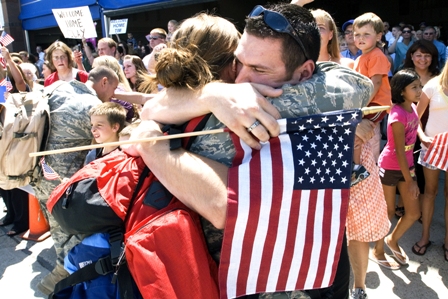Suicide the unseen enemy
for Marines
Corps had military’s highest
rate in 2009
By Gretel C.
Kovach, UNION-TRIBUNE STAFF WRITER
Sunday, May 2, 2010 at 12:56
a.m.
RESOURCES
• National Suicide Prevention Lifeline: (800) 273-8255
• Military OneSource 24-hour hotline: (800) 342-9647
• Information and online live chat for veterans: suicidepreventionlifeline.org
Commanders recently honored a young lance corporal in Afghanistan
for saving another Marine’s life, giving the hero a medal. But
it was not a sniper or roadside bomb that nearly claimed the Marine in
distress.
It was a battle with suicide. The U.S. military’s own fight with that
enemy has escalated during the more than eight years of combat between
the Afghanistan and Iraq wars.
In 2009, the Marine
Corps reported the highest suicide rate among the armed
forces — 24 per 100,000. It lost more troops to suicide than combat in
Afghanistan last year. Fifty-two took their own lives in 2009, including
11 who did so while deployed.
The active-duty Army had 21.7 suicides per 100,000, its highest rate
since the Vietnam War.
Its much larger force suffered 160 suspected or confirmed suicides.
In April, Lance Cpl. Jonathan Burson, 21, had eaten half his sandwich
at the Camp Leatherneck chow hall in Helmand
province, Afghanistan, when he noticed something odd. A
fellow Marine was sitting alone, weeping.
Burson asked what was wrong, and they spoke for hours. The next
night, the distraught Marine revealed his plan to kill himself. Burson
called for help.
His superiors with the 1st Marine Expeditionary Force, the Camp
Pendleton-based contingent that recently took command of U.S. military
operations in southern Afghanistan, gave him the Navy and Marine Corps
Achievement Medal. They hope Burson’s example will inspire other Marines
to take care of their own.
The intervention was success in action for the force’s
suicide-prevention program. But the Marines, and the military overall,
have been losing ground in their efforts against suicide. The deaths
continue despite an array of projects rolled out in recent years to help
troops cope with combat and operational stress.
Military leaders, service members’ families and advocates for troops
are troubled and perplexed by the trend. Marine commanders said that
while the stigma against mental illness and perceptions of weakness
remain prominent, the prevention campaign has made it more likely for
the rank and file to seek care.
“We never slowed our efforts in suicide prevention,” so the rising
rates have been stunning, said Cmdr. Aaron Werbel, head of the Marine
Corps’ Suicide Prevention Program. “There has been a lot of really
serious concern. Of all the things we are doing, what are we missing? Is
there something that we have not hit upon yet that would help us turn
this around?”
About two years ago, the Navy opened a Combat & Operational
Stress Control Center in San Diego.
It also launched a color-coded system for helping Marines cope with
stress in their ranks.
Marines may pride themselves on loving “the suck,” as they say, but
now they are ordered to avoid unnecessary stress, for example by
sleeping and eating enough. The Corps also introduced hyper-realistic
combat training to help inoculate troops against post-traumatic stress
disorder.
When research showed that 85 percent of suicides were being committed
by 17- to 24-year-old enlisted personnel, the Corps developed “Never
Leave a Marine Behind.” The program includes a short film depicting how
“a good Marine” can find himself in a bad way, overwhelmed by stress,
plus testimonials from two wives who lost husbands stationed at Camp
Pendleton to suicide.
It also includes a TV broadcast in which Marine Commandant James Conway
declares, “Marines, it is OK to ask for help.”
One who did was Staff Sgt. Jeremiah Workman, who received the Navy
Cross for his valor during a firefight in Fallujah, Iraq. Workman’s
struggle continued on the home front with PTSD and a suicide attempt,
until he sought treatment and became a father.
“I didn’t want to be another victim of the war,” Workman said in a
documentary clip for the Marine Corps. “Guys that come back from Iraq or
Afghanistan and take their lives, it’s like an 8,000-mile sniper shot
and it’s another victory for the enemy.”
More programs for staff officers and other subsets of Marines are in
development.
“We feel very strongly about targeted, evocative training for leaders
at all levels that makes suicide prevention organic to the culture of
the Marine Corps, so it is not seen as some touchy-feely, different
thing,” Werbel said.
The Corps is waging a tremendous campaign against suicide, said
Bonnie Carroll, founder of the Tragedy Assistance Program for Survivors,
a national support organization for families coping with the death of a
service member.
Carroll, who serves on the Pentagon’s suicide-prevention task force,
visited the Parris Island, S.C., boot camp in February and came away
impressed by how drill instructors invoke the bonds among Marines. “They
said: ‘When you get in trouble in combat, you call in air support. When
you get in trouble in life, you call on your buddies.’ ”
In the past, Marines who knew they needed help often avoided
mental-health providers for fear of hurting their careers. These days,
some counselors have been pulled from hospital duty to train with units
heading to war.
Lt. Cmdr. John Fleming,
a psychiatric nurse practitioner and one of the first embedded
providers, has spent several months training alongside the 1st Marine
Division infantrymen with whom he will deploy to Afghanistan in the
fall.
“When you are doing these 15- to 20-mile hikes alongside these
Marines and you are hurting as much as they do, they look at you like:
‘Wow, this is not just that doc who sits up in the office. This is
someone who understands what we are doing.’ It really removes the
barrier,” Fleming said.
For decades, the all-volunteer military had fewer suicides than the
general population. But in 2008, the Marines pulled up to the
age-adjusted civilian rate of about 20 per 100,000 people. There has
been no sign of retreat since: After last year’s record rate, 12 Marines
have committed suicide this year.
Despite the dark jokes Marines crack about becoming “pink mist,” it
seems obvious that repeated exposure to the horrors of war — seeing
friends ripped apart by bombs or children inadvertently shot at
checkpoints — would exact a psychological toll.
Research has long shown that trauma is cumulative. When it comes to
combat stress and suicide, though, the findings are mixed.
“At this point in time, there does not appear to be any scientific
correlation between the number of deployments and those that are at
risk, but I’m just hard-pressed to believe that’s not the case,” Adm. Michael
Mullen, chairman of the Joint
Chiefs of Staff, said during a conference in January.
His hunch is supported by the Army’s battlefield survey of soldiers
in Afghanistan and Iraq last year, which reported that the rate of
mental-health problems such as depression, anxiety and PTSD rose with
the number of combat tours.
The Marine Corps, strained along with the Army by multiple war
deployments, aims to provide troops with twice as much time at home as
time deployed over the next year.
A long list of stressors, including relationship problems, money
troubles and job dissatisfaction, can push a Marine over the edge,
Werbel said. While combat stress may factor into some suicides, the war
tempo is wearing on the entire force.
For instance, 16 of the Marines who committed suicide last year had
never deployed.
“The Marine who has never deployed is still at risk for suicide. With
this high ‘op tempo,’ they may be doing the job of three Marines,”
Werbel said.
One night in 2006, Mary Gallagher
returned from a day trip to Disneyland
to find the front door of her Camp Pendleton home locked.
Gallagher sent her two daughters, ages 12 and 17, around through the
garage, where they found their father, Gunnery Sgt. James Gallagher,
hanging from the rafters.
Gallagher had talked a Marine out of suicide a month before he took
his own life, his widow said. He had been her lifelong protector for 23
years, since they fell in love as high school sweethearts. He was
devastated by the death of his company commander in Iraq and then the
order to work in the rear when his infantry unit deployed again to
Japan.
But he wasn’t one to share his problems, Mary Gallagher said. Not
even with her.
The night he died, the Gallaghers’ neighbors gathered around them in
shock and panic.
“This is just as heartbreaking for them as it is for me,” Gallagher
said. “That brotherhood is within each other. They are family in the
Marines.
“You lose one and that’s a ripple effect within them all.”
Gretel C. Kovach: (619) 293-1293; gretel.kovach@uniontrib.com.
Follow on Twitter at gckovach.
 A welcoming home for our Troops.
A welcoming home for our Troops.

